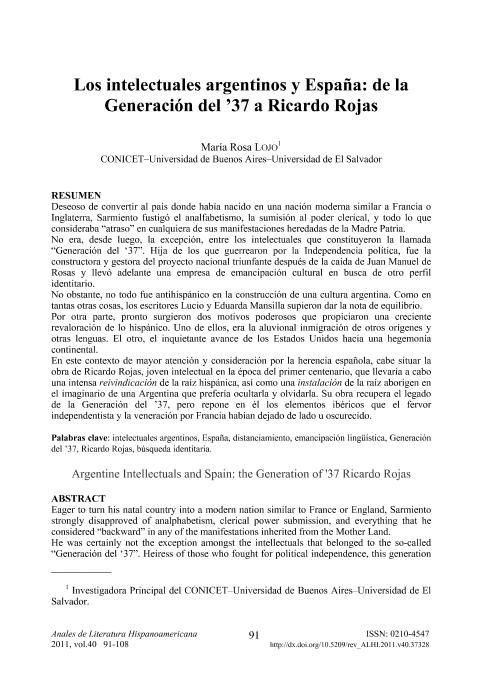Mostrar el registro sencillo del ítem
dc.contributor.author
Lojo Calatrava, Maria Rosa

dc.date.available
2023-03-28T16:00:21Z
dc.date.issued
2011-12
dc.identifier.citation
Lojo Calatrava, Maria Rosa; Los intelectuales argentinos y España: de la Generación del ’37 a Ricardo Rojas; Universidad Complutense de Madrid; Anales de Literatura Hispanoamericana; 40; 12-2011; 91-108
dc.identifier.issn
0210-4547
dc.identifier.uri
http://hdl.handle.net/11336/191871
dc.description.abstract
Deseoso de convertir al país donde había nacido en una nación moderna similar a Francia o Inglaterra, Sarmiento fustigó el analfabetismo, la sumisión al poder clerical, y todo lo que consideraba "atraso" en cualquiera de sus manifestaciones heredadas de la Madre Patria. No era, desde luego, la excepción, entre los intelectuales que constituyeron la llamada Generación del 37. Hija de los que guerrearon por la Independencia política, fue la constructora y gestora del proyecto nacional triunfante después de la caída de Juan Manuel de Rosas y llevó adelante una empresa de emancipación cultural en busca de otro perfil identitario.No obstante, no todo fue antihispánico en la construcción de una cultura argentina. Como en tantas otras cosas, los escritores Lucio y Eduarda Mansilla supieron dar la nota de equilibrio. Por otra parte, pronto surgieron dos motivos poderosos que propiciaron una creciente revaloración de lo hispánico. Uno de ellos, era la aluvional inmigración de otros orígenes y otras lenguas. El otro, el inquietante avance de los Estados Unidos hacia una hegemonía continental. En este contexto de mayor atención y consideración por la herencia española, cabe situar la obra de Ricardo Rojas, joven intelectual en la época del primer Centenario, que llevaría a cabo una intensa reivindicación de la raíz hispánica, así como una (re)instalación de la raíz aborigen en el imaginario de una Argentina que prefería ocultarla y olvidarla. Su obra recupera el legado de la Generación del 37, pero repone en él los elementos ibéricos que el fervor independentista y la veneración por Francia habían dejado de lado u oscurecido.
dc.description.abstract
Eager to turn his natal country into a modern nation similar to France or England, Sarmiento strongly disapproved of analphabetism, clerical power submission, and everything that he considered “backward” in any of the manifestations inherited from the Mother Land. He was certainly not the exception amongst the intellectuals that belonged to the so-called “Generación del ‘37”. Heiress of those who fought for political independence, this generation was the ideologist and promoter of a national project that became successful after the downfall of Juan Manuel de Rosas, and carried out an enterprise of cultural emancipation in search of a new identity profile. However, not everything was anti-Spanish in the construction of the Argentinean culture. Like in many other things, the writers Lucio and Eduarda Mansilla were able to reach equilibrium. In addition, soon arouse two powerful reasons that encouraged an increasing revalorization of Hispanic roots. One of them was the massive immigration from other places and languages. The other one, the disturbing pace of the United Sates of America towards becoming a continental hegemony. In this context of more attention and consideration for the Spanish heritage, we can situate the work of Ricardo Rojas, a young intellectual around the first centenary of the revolution, who would carry out an intense vindication of the Hispanic roots, as well as the “resetting” of the aboriginal roots in the Argentinean imaginary, where they had been deliberately hidden and forgotten. His written works recover the legacy left by “Generación del ’37”, but also reset the Spanish elements that the independence fervor and the veneration for French culture had left aside and obscured.
dc.format
application/pdf
dc.language.iso
spa
dc.publisher
Universidad Complutense de Madrid

dc.rights
info:eu-repo/semantics/openAccess
dc.rights.uri
https://creativecommons.org/licenses/by/2.5/ar/
dc.subject
GENERACIÓN DEL '37
dc.subject
MANSILLA
dc.subject
ROJAS
dc.subject
REIVINDICACIÓN
dc.subject.classification
Literaturas Específicas

dc.subject.classification
Lengua y Literatura

dc.subject.classification
HUMANIDADES

dc.title
Los intelectuales argentinos y España: de la Generación del ’37 a Ricardo Rojas
dc.title
Argentine Intellectuals and Spain: the Generation of '37 Ricardo Rojas
dc.type
info:eu-repo/semantics/article
dc.type
info:ar-repo/semantics/artículo
dc.type
info:eu-repo/semantics/publishedVersion
dc.date.updated
2023-03-28T14:05:52Z
dc.journal.volume
40
dc.journal.pagination
91-108
dc.journal.pais
España

dc.journal.ciudad
Madrid
dc.description.fil
Fil: Lojo Calatrava, Maria Rosa. Consejo Nacional de Investigaciones Científicas y Técnicas; Argentina. Universidad del Salvador. Facultad de Filosofía, Historia y Letras; Argentina. Universidad de Buenos Aires. Facultad de Filosofía y Letras. Instituto de Literatura Argentina "Ricardo Rojas"; Argentina
dc.journal.title
Anales de Literatura Hispanoamericana
dc.relation.alternativeid
info:eu-repo/semantics/altIdentifier/url/http://revistas.ucm.es/index.php/ALHI/article/view/37328
dc.relation.alternativeid
info:eu-repo/semantics/altIdentifier/doi/https://doi.org/10.5209/rev_ALHI.2011.v40.37328
Archivos asociados
